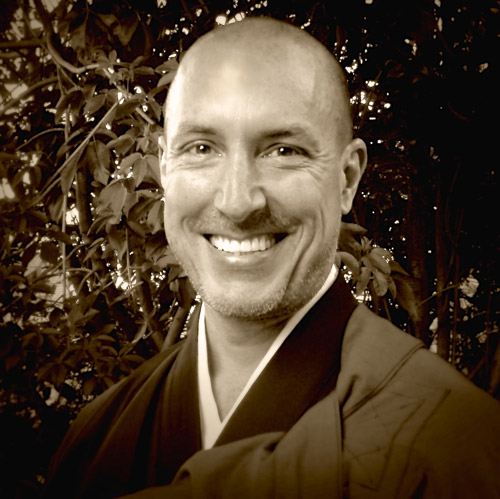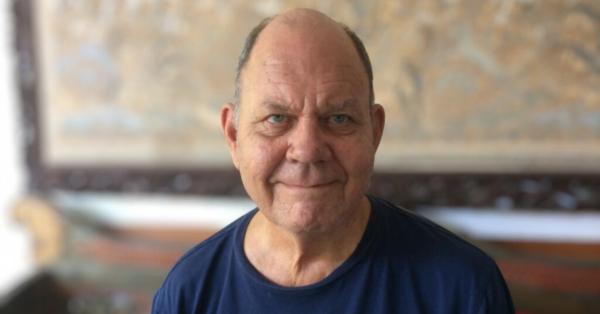A monthly update on the Sangha Project, from Robert Thomas
In the last year I’ve been working with the San Francisco Zen Center Programs staff to offer two online courses, both successful. In the fall of 2014 I offered a 4-week course titled Manifesting the Wisdom of the Body with yoga teacher Samantha Ostergaard. For this course, 110 people from over 7 states and 2 countries participated and learned the basics of integrating Zen mindfulness with body awareness, movement and flexibility. In the spring of 2015, I offered a 7-week course on the fundamental practices and principles of Zen called Meeting This Moment, joining 95 participants from 15 states and 6 countries.
This month, I would like to share with you some brief thoughts about my experience of teaching and practicing together remotely, with the support of online tools.

Do-On Robert Thomas
Online courses are an experimental, innovative and exciting direction for me as a dharma teacher and as leader of the Sangha Project––the SFZC initiative to extend Zen Center’s teachings and practice to the wider world via the internet. Even more important, it’s also an experimental, innovative and exciting development for Zen practice at SFZC, which until now has been focused almost exclusively on an in-person, physical-center-based style of practice and transmission of the Dharma.
Based on my experience, I can see that online courses offer a real opportunity to connect with and support people who want to have a regular practice and want to practice together with others, but have little or no access to a zendo, a teacher or a sangha. Online courses allow us to widen the circle of practice and include people who live far away, those whose schedules are constrained by work and family responsibilities, and many others practicing with such issues as lack of mobility or chronic illness.
The challenge for me, as a teacher in the Suzuki Roshi lineage of “warm hand to warm hand” practice, is how to convey the teachings in a sufficiently intimate and authentic manner that it can truly support people to establish a practice, to deepen their practice, and to continue on the path of practice.
There are two simple lessons I’ve learned so far about establishing a deeper sense of warmth and connection in our online course offerings that I would like to share with you: The first is the importance of communicating through multiple modalities; the second is having the willingness to experiment with our practice.
Multiple Modes of Communication
Traditionally, dharma talks are an essential and important vehicle for conveying the Dharma. Online, the dharma talk form is useful because talks can be viewed live or archived to view at a later date. But for the most part, live or taped lectures offer a single line of communication: from the teacher to practitioner. To support more participation, we added live dharma talks that were followed by group question-and-answer (Q&A) sessions.
We also realized that it is important to create opportunities for practitioners to engage directly with each other. Not only does this open more avenues for learning, but it also gives everyone––practitioners and teachers––a sense that they are not alone in their practice. To make this possible, we began using a phone conferencing system that allows everyone to meet together as a large group and then break out into smaller groups. Our next step is to develop a means to present live dharma talks, Q&A and small-group breakout sessions with video as well as audio.
Of course our practice is not only transmitted through spoken means. Another essential form of practice is sitting together in the shared silence of zazen. In Meeting this Moment, we offered a “virtual zendo” twice a day with morning and early evening sessions of zazen. Course participants joined each sitting session through their laptops, tablets, or smartphones. Each of us could see each other, hear the beginning and ending bells, and sense in a powerful way that we were part of a worldwide (literally!) network of practitioners.
 Willingness to Experiment
Willingness to Experiment
One of the most important elements of our online course development has been a willingness to experiment. Of course this willingness is not only on my part but is necessarily shared by the practitioners who join me in this new way of practicing. We’ve picked up this focus on experimentation from the local tech community and their “lean” methodologies. From this we learned that the only way we could find out if offering Zen teachings and practice opportunities online will actually work to support people in their practice is to be willing to experiment––to try some things and see what works! Sometimes this means failing, but also it creates the possibility of finding new and previously unseen ways to be successful in supporting people’s practice.
We continue to experiment with the online zendo I mentioned above, and there are a number of other experiments we’ve tried that we think have been successful enough to continue to develop. Several months back, we ran another small-scale experiment where we offered people a way to create “dharma buddies” who used simple online tools to stay connected and support each other. In the Manifesting the Wisdom of the Body course and with the Dharma Buddies experiment, we sent participants daily email messages with an inspiring dharma quote and photo. A significant number of people found the daily messages quite encouraging, so we plan to incorporate this element into future online courses. Following up on Meeting This Moment, I have met with course participants face to face in practice discussions via video. This experiment has a great deal of potential to create powerful connection and ways to support practitioners around the world to deepen their practice and apply their practice to their real-world challenges.
As someone who has lived in residence and practiced at SFZC for nearly 22 years, I always tell people that online practice will never be a substitute for the intimacy and depth of in-person practice. However, not everyone has the opportunity to regularly visit a center for a class, a practice period or a meeting with a teacher. Online courses do open the door for more people to participate and benefit from practice, and clearly we still have many modalities and forms to test and experiment with, and much more to learn.
If you have any thoughts about how to convey authentic warm-hand-to-warm-hand Zen teachings online, I would love to hear from you. Please feel free to contact me at sanghaproject@sfzc.org.
Thank you!











